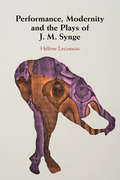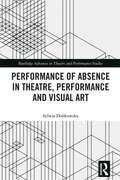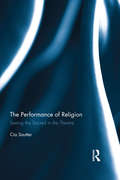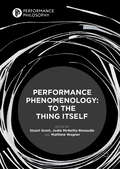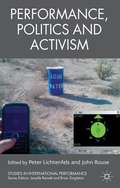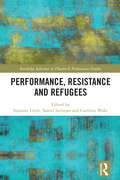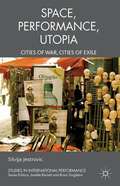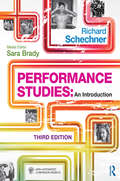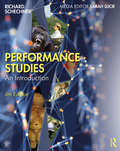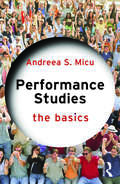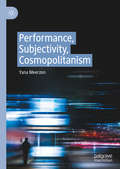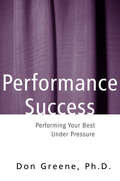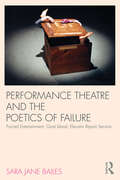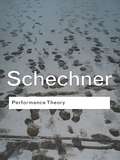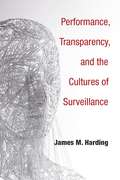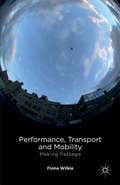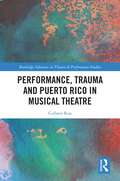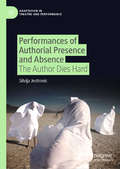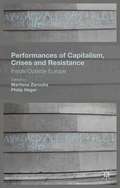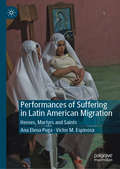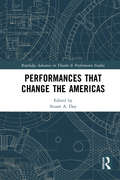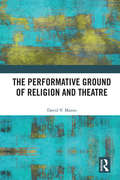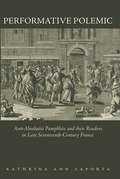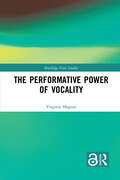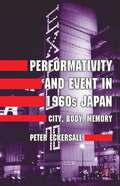- Table View
- List View
Performance, Modernity and the Plays of J. M. Synge
by Helene LecossoisIrish Revivalist playwright J. M. Synge is often regarded as a realist. Yet what happens when his work is analysed through wider performance studies and situated alongside less familiar historical contexts? By addressing this question, Hélène Lecossois offers new and valuable perspectives on Synge's plays while at the same time engaging with the complexity of his treatment of a range of performance practices – from keening at rural funerals to the performances of 'native villagers' in the entertainment section of International Exhibitions. What emerges from her study is a dramatist acutely aware of the ability of theatre in performance to counteract relentless forward-moving narratives of modernity. Through detailed, contextualized case studies, the book simultaneously makes meaningful contributions to performance studies and opens up theoretical questions of performance relating to the status of the object on stage, the body on stage and theatrical time.
Performance of Absence in Theatre, Performance and Visual Art (Routledge Advances in Theatre & Performance Studies)
by Sylwia DobkowskaThis research project investigates the concepts of absence across the disciplines of visual art, theatre, and performance. Absence in the centre of an ideology frees the reader from the dominant meaning. The book encourages active engagement with theatre theory and performances. Reconsideration of theories and experiences changes the way we engage with performances, as well as social relations and traditions outside of theatre. Sylwia Dobkowska examines and theorises absence and presence through theatre, performance, and visual arts practices. This book will be of great interest to students and scholars of theatre, visual art and philosophy.
The Performance of Religion: Seeing the sacred in the theatre
by Cia SautterThe performing arts are uniquely capable of translating a vision of an ideal or sacred reality into lived practice, allowing an audience to confront deeply held values and beliefs as they observe a performance. However, there is often a reluctance to approach distinctly religious topics from a performance studies perspective. This book addresses this issue by exploring how religious values are acted out and reflected on in classic Western theatre, with a particular emphasis on the plays put on during the Globe Theatre‘s yearlong season of 'Shakespeare and the Bible'. Looking at plays such as Much Ado About Nothing, Dr. Faustus and Macbeth, each chapter includes ethnographic overviews of the performance of these plays as well as historical and theological perspectives on the issues they address. The author also utilizes scholarship from other academics, such as Paul Tillich and Martin Buber, in examining the relationship between art and culture. This helps readers of this book to look at religion in culture, and raise questions and explore ideas about how people appraise their religious values through an encounter with a performance. The Performance of Religion: Seeing the sacred in the theatre treads new ground in bringing performance and religious studies scholarship into direct conversation with one another. As such, it is essential reading for any academic with an interest in theology, religion and ethics and their expression in culture through the performing arts.
Performance Phenomenology: To The Thing Itself (Performance Philosophy)
by Stuart Grant Jodie McNeilly-Renaudie Matthew WagnerThis collection of essays addresses emergent trends in the meeting of the disciplines of phenomenology and performance. It brings together major scholars in the field, dealing with phenomenological approaches to dance, theatre, performance, embodiment, audience, and everyday performance of self. It argues that despite the wide variety of philosophical, ontological, epistemological, historical and methodological differences across the field of phenomenology, certain tendencies and impulses are required for an investigation to stand as truly phenomenological. These include: description of experience; a move towards fundamental conditions or underlying essences; and an examination of taken-for-granted presuppositions. The book is aimed at scholars and practitioners of performance looking to deepen their understanding of phenomenological concepts and methods, and philosophers concerned with issues of embodiment, performativity and enaction.
Performance, Politics and Activism
by Peter Lichtenfels John RouseThis collection of essays on politics, the performing arts, and various forms of activist performance uses the framework of performance studies to explore the engagements of political resistance, public practice and performance media. It places these engagements on various scales of performance production within local, national and transnational structures of neoliberal and liberal government and power. Performance has always been a way of articulating the conditions of contemporary society, and of pointing through the body of the performance to ways of defining, understanding and changing those conditions. Throughout these essays performance takes place in the environments of heightened everyday action, the aesthetic and cultural activity of the performing arts, and in the activist performance of political commitment. These trajectories in performance studies delineate the way people identify themselves and communicate with one another, both in attempts to change the structures of governance they experience, and vitally, alongside those structures.
Performance, Resistance and Refugees (Routledge Advances in Theatre & Performance Studies)
by Suzanne Little Samid Suliman Caroline WakeThis book offers a unique Australian perspective on the global crisis in refugee protection. Using performance as both an object and a lens, this volume explores the politics and aesthetics of migration control, border security and refugee resistance. The first half of the book, titled On Stage, examines performance objects such as verbatim and documentary plays, children’s theatre, immersive performance, slam poetry, video art and feature films. Specifically, it considers how refugees, and their artistic collaborators, assert their individuality, agency and authority as well as their resistance to cruel policies like offshore processing through performance. The second half of the book, titled Off Stage, employs performance as a lens to analyse the wider field of refugee politics, including the relationship between forced migrants and the forced displacement of First Nations peoples that underpins the settler-colonial state, philosophies of cosmopolitanism, the role of the canon in art history and the spectacle of bordering practices. In doing so, it illuminates the strategic performativity—and nonperformativity—of the law, philosophy, the state and the academy more broadly in the exclusion and control of refugees. Taken together, the chapters in this volume draw on, and contribute to, a wide range of disciplines including theatre and performance studies, cultural studies, border studies and forced migration studies, and will be of great interest to students and scholars in all four fields.
Performance, Space, Utopia
by Silvija JestrovicThe war in the Balkans that took place between 1991-1995 forms the context of this book. It has been variously viewed as ethnic strife, religious conflict, or civil war but seldom has it been described as a war against cities. Belgrade and Sarajevo offer a fascinating comparative case study, not only because the two cities belong to the same historical narrative of the breakdown of Yugoslavia, but because of the ways in which their various performances both complement and contradict one another. This book examines how performance and theatricality became modes of being and acting in the city, even strategies of physical and ethical survival; yet so often it is exile, both as marginalisation within and exodus from the city, that emerges as the defining consequence of living in Sarajevo or Belgrade in the 1990s.
Performance Studies
by Richard SchechnerThe publication of Performance Studies: An Introduction was a defining moment for the field. Richard Schechner's pioneering textbook provides a lively and accessible overview of the full range of performance for undergraduates at all levels and beginning graduate students in performance studies, theatre, performing arts, and cultural studies. Among the topics discussed are the performing arts and popular entertainments, rituals, play and games, and the performances of everyday life. Supporting examples and ideas are drawn from the social sciences, performing arts, poststructuralism, ritual theory, ethology, philosophy, and aesthetics. This third edition is accompanied by an all-new companion website curated by a dedicated media editor, with the following resources for instructors and students: Interactive glossary Multiple choice questions Powerpoint Slides. Videos Website links for further study Tutorials on specific skills within Performance Studies Sample Discussion Questions Exercises and Activities Sample Syllabi The book itself has also been revised, with 25 new extracts and biographies, up-to-date coverage of global and intercultural performances, and further exploration of the growing international presence of Performance Studies as a discipline. Performance Studies is the definitive overview for undergraduates, with primary extracts, student activities, key biographies and over 200 images of global performance.
Performance Studies: An Introduction
by Richard SchechnerRichard Schechner's pioneering textbook is a lively, accessible overview of the full range of performance, with primary extracts, student activities, key biographies, and over 200 images of global performance. The publication of Performance Studies: An Introduction was a defining moment for the field. This fourth edition has been revised with two new chapters, up-to-date coverage of global and intercultural performances, and an in-depth exploration of the growing international importance of Performance Studies. Among the book’s topics are the performing arts and popular entertainments, rituals, play and games, social media, the performances of the paleolithic period, and the performances of everyday life. Supporting examples and ideas are drawn from the social sciences, performing arts, poststructuralism, ritual theory, ethology, philosophy, and aesthetics. Performance Studies: An Introduction features the broadest and most in-depth analysis possible. Performance Studies: An Introduction is the definitive overview for undergraduates at all levels and beginning graduate students in performance studies, the performing arts, and cultural studies. This new edition is also supported by a fully updated companion website, offering a variety of interactive resources, teaching tools, and research links.
Performance Studies: The Basics (The Basics)
by Andreea S. MicuPerformance Studies: The Basics offers an overview of the multiple, often overlapping definitions of performance, from performance art, performance as everyday life, and rituals, to the performative dimensions of identity, such as gender, race and sexuality. This book defines the interdisciplinary field of performance studies as it has evolved over the past four decades at the intersection of academic scholarship and artistic and activist practices. It discusses performance as an important means of communicating and of understanding the world, highlighting its intersections with critical theory and arguing for the importance of performance in the study of human behaviour and social practices. Complete with a helpful glossary and bibliography, as well as suggestions for further reading, this book is an ideal starting point for those studying performance studies as well as for general readers with an interest in the subject.
Performance, Subjectivity, Cosmopolitanism
by Yana MeerzonThis book looks at the connection between contemporary theatre practices and cosmopolitanism, a philosophical condition of social behaviour based on our responsibility, respect, and healthy curiosity to the other. Advocating for cosmopolitanism has become a necessity in a world defined by global wars, mass migration, and rise of nationalism. Using empathy, affect, and telling personal stories of displacement through embodied encounter between the actor and their audience, performance arts can serve as a training ground for this social behavior. In the centre of this encounter is a new cosmopolitan: a person of divided origins and cultural heritage, someone who speaks many languages and claims different countries as their place of belonging. The book examines how European and North American theatres stage this divided subjectivity: both from within, the way we tell stories about ourselves to others, and from without, through the stories the others tell about us.
Performance Success: Performing Your Best Under Pressure
by Don GreenePerformance Success teaches a set of skills so that a musician can be ready to go out and sing or play at his or her highest level, working with energies that might otherwise be wasted in unproductive ways. This is a book of skills and exercises, prepared by a master teacher.
Performance Theatre and the Poetics of Failure
by Sara Jane BailesWhat does it mean to "fail" in performance? How might staging failure reveal theatre’s potential to expand our understanding of social, political and everyday reality? What can we learn from performances that expose and then celebrate their ability to fail? In Performance Theatre and the Poetics of Failure, Sara Jane Bailes begins with Samuel Beckett and considers failure in performance as a hopeful strategy. She examines the work of internationally acclaimed UK and US experimental theatre companies Forced Entertainment, Goat Island and Elevator Repair Service, addressing accepted narratives about artistic and cultural value in contemporary theatre-making. Her discussion draws on examples where misfire, the accidental and the intentionally amateur challenge our perception of skill and virtuosity in such diverse modes of performance as slapstick and punk. Detailed rehearsal and performance analysis are used to engage theory and contextualise practice, extending the dialogue between theatre arts, live art and postmodern dance. The result is a critical account of performance theatre that offers essential reading for practitioners, scholars and students of Performance, Theatre and Dance Studies.
Performance Theory
by Richard SchechnerFew have had quite as much impact in both the academy and in the world of theatre production as Richard Schechner. For more than four decades his work has challenged conventional definitions of theatre, ritual and performance. When this seminal collection first appeared, Schechner's approach was not only novel, it was revolutionary: drama is not just something that occurs on stage, but something that happens in everyday life, full of meaning, and on many different levels. Within these pages he examines the connections between Western and non-Western cultures, theatre and dance, anthropology, ritual, performance in everyday life, rites of passage, play, psychotherapy and shamanism.
Performance, Transparency, and the Cultures of Surveillance
by James M. HardingPlacing the disciplines of performance studies and surveillance studies in a timely critical dialogue, Performance, Transparency, and the Cultures of Surveillance not only theorizes how surveillance performs but also how the technologies and corresponding cultures of surveillance alter the performance of everyday life. This exploration draws upon a rich array of examples from theatre, performance, and the arts, all of which provide vivid illustration of the book’s central argument: that the rise of the surveillance society coincides with a profound collapse of democratic oversight and transparency—a collapse that, in turn, demands a radical rethinking of how performance practitioners conceptualize art and its political efficacy. The book thus makes the case that artists and critics must reexamine—indeed, must radically redefine—their notions of performance if they are to mount any meaningful counter to the increasingly invasive surveillance society.
Performance, Transport and Mobility: Making Passage
by F. WilkiePerformance, Transport and Mobility is an investigation into how performance moves, how it engages with ideas about movement, and how it potentially shapes our experiences of movement. Using a critical framework drawn from the 'mobility turn' in the social sciences, it analyses a range of performances that explore what it means to be in transit.
Performance, Trauma and Puerto Rico in Musical Theatre (Routledge Advances in Theatre & Performance Studies)
by Colleen RuaThis study positions four musicals and their associated artists as mobilizers of defiant joy in relation to trauma and healing in Puerto Rico. The book argues that the historical trajectory of these musicals has formed a canon of works that have reiterated, resisted or transformed experiences of trauma through linguistic, ritual, and geographic interventions. These traumas may be disaster-related, migrant-related, colonial or patriarchal. Bilingualism and translation, ritual action, and geographic space engage moments of trauma (natural disaster, incarceration, death) and healing (community celebration, grieving, emancipation) in these works. The musicals considered are West Side Story (1957, 2009, 2019); The Capeman (1998); In the Heights (2008); and Hamilton (2015). Central to this argument is that each of the musicals discussed is tied to Puerto Rico, either through the representation of Puerto Rican characters and stories, or through the Puerto Rican positionality of its creators. The author moves beyond the musicals to consider Lin-Manuel Miranda as an embodied site of healing, that has been met with controversy, as well as posthurricane Maria relief efforts led by Miranda on the island and from a distance. In each of the works discussed, acts of belonging shape notions of survivorship and witness. This book also opens a dialogue between these musicals and the work of island-based artists Y no había luz, that has served as sites of first response to disaster. This book will be of interest to students and scholars in Latinx Theatre, Musical Theatre and Translation studies.
Performances of Authorial Presence and Absence: The Author Dies Hard (Adaptation in Theatre and Performance)
by Silvija JestrovicThis book takes Roland Barthes’s famous proclamation of ‘The Death of the Author’ as a starting point to investigate concepts of authorial presence and absence on various levels of text and performance. By offering a new understanding of ‘the author’ as neither a source of unquestioned authority nor an obsolete construct, but rather as a performative figure, the book illuminates wide-ranging aesthetic and political aspects of ‘authorial death’ by asking: how is the author constructed through cultural and political imaginaries and erasures, intertextual and intertheatrical references, re-performances and self-referentiality? And what are the politics and ethics of these constructions?
Performances of Capitalism, Crises and Resistance
by Marilena Zaroulia Philip HagerThis engaging study examines the issue of crisis in European performance since the collapse of global financial markets in 2008. The book's chapters examine diverse performances of crisis primarily in three cities with a loaded past and present for Europe, as idea and geopolitical reality: London, Athens and Berlin. Presenting a range of work – from the National Theatre's repertoire to alternative forms of theatre-making in 'other' spaces; from the Occupy LSX to cultural performance and 'invisible', quotidian performances – Performances of Capitalism, Crises and Resistance presents new approaches to performance as a form 'in crisis' and as reflecting the in-crisis permutation of the 'inside/outside' dichotomy, fundamental in the conception of Europe and the EU. In doing so, this book makes an argument for performance within and against neoliberal promises; as a monolithic factor implicated in the machinery of capitalism or multiple, emergent bodies of resistance.
Performances of Suffering in Latin American Migration: Heroes, Martyrs and Saints
by Ana Elena Puga Víctor M. EspinosaThis book questions the reliance on melodrama and spectacle in social performances and cultural productions by and about migrants from Mexico and Central America to the United States. Focusing on archetypal characters with nineteenth-century roots that recur in the twentieth- and twenty-first centuries – heroic saviors, saintly mothers and struggling fathers, martyred children and rebellious youth – it shows how theater practitioners, filmmakers, visual artists, advocates, activists, journalists, and others who want to help migrants often create migrant melodramas, performances that depict their heroes as virtuous victims at the mercy of evil villains. In order to gain respect for the human rights that are supposedly already theirs on paper and participate in a global market that trades in performances of suffering, migrants themselves sometimes accept the roles into which they are cast, or even cast themselves. Some express their suffering publicly, often on demand. Others find ways to twist, parody, resist, or reject migrant melodrama.
Performances that Change the Americas (Routledge Advances in Theatre & Performance Studies)
by Stuart A. DayThis collection of essays explores activist performances, all connected to theater or performance training, that have changed the Americas—from Canada to the Southern Cone. Through the study of specific examples from numerous countries, the authors of this volume demonstrate a crucial, shared outlook: they affirm that ordinary people change the direction of history through performance. This project offers concrete, compelling cases that emulate the modus operandi of people like historian Howard Zinn. In the same spirit, the chapters treat marginal groups whose stories underscore the potentially unstoppable and transformative power of united, embodied voices. This book will be of great interest to students and scholars of theatre, performance, art and politics.
The Performative Ground of Religion and Theatre
by David V. MasonReligious practitioners and theatregoers have much in common. So much, in fact, that we can say that religion is often a theatrical phenomenon, and that theatre can be a religious experience. By examining the phenomenology of religion, we can in turn develop a better understanding of the phenomenology of theatre. That is to say, religion can show us the ways in which theatre is not fake. This study explores the overlap of religion and theatre, especially in the crucial area of experience and personal identity. Reconsidering ideas from ancient Greece, premodern India, modern Europe, and the recent century, it argues that religious adherents and theatre audiences are largely, themselves, the mechanisms of their experiences. By examining the development of the philosophy of theatre alongside theories of religious action, this book shows how we need to adjust our views of both. Featuring attention to influential notions from Plato and Aristotle, from the Natyashastra, from Schleiermacher to Sartre, Bourdieu, and Butler, and considering contemporary theories of performance and ritual, this is vital reading for any scholar in religious studies, theatre and performance studies, theology, or philosophy.
Performative Polemic: Anti-Absolutist Pamphlets and their Readers in Late Seventeenth-Century France (The Early Modern Exchange)
by Kathrina Ann LaPortaPerformative Polemic is the first literary historical study to analyze the “war of words” unleashed in the pamphlets denouncing Louis XIV’s absolute monarchy between 1667 and 1715. As conflict erupted between the French ruler and his political enemies, pamphlet writers across Europe penned scathing assaults on the his bellicose impulses and expansionist policies. This book investigates how pamphlet writers challenged the monarchy’s monopoly over the performance of sovereignty by contesting the very mechanisms through which the crown legitimized its authority at home and abroad. Author Kathrina LaPorta offers a new conceptual framework for reading pamphlets as political interventions, asserting that an analysis of the pamphlet’s form is crucial to understanding how pamphleteers seduced readers by capitalizing on existing markets in literature, legal writing, and journalism. Pamphlet writers appealed to the theater-going public that would have been attending plays by Molière and Racine, as well as to readers of historical novels and periodicals. Pamphleteers entertained readers as they attacked the performative circuitry behind the curtain of monarchy.
The Performative Power of Vocality (Routledge Voice Studies)
by Virginie MagnatThe Performative Power of Vocality offers a fresh perspective on voice as a subject of critical inquiry by employing an interdisciplinary and cross-cultural approach. Conventional treatment of voice in theatre and performance studies too often regards it as a subcategory of actor training, associated with the established methods that have shaped voice pedagogy within Western theatre schools, conservatories, and universities. This monograph significantly deviates from these dominant models through its investigation of the non-discursive, material, and affective efficacy of vocality, with a focus on orally transmitted vocal traditions. Drawing from her performance training, research collaborations, and commitment to cultural diversity, Magnat proposes a dialogical approach to vocality. Inclusive of established, current, and emerging research perspectives, this approach sheds light on the role of vocality as a vital source of embodied knowledge, creativity, and well-being grounded in process, practice, and place, as well as a form of social and political agency. An excellent resource for qualitative researchers, artist-scholars, and activists committed to decolonization, cultural revitalization, and social justice, this book opens up new avenues of understanding across Indigenous and Western philosophy, performance studies, musicology, ethnomusicology, sound and voice studies, anthropology, sociology, phenomenology, cognitive science, physics, ecology, and biomedicine.
Performativity and Event in 1960s Japan: City, Body, Memory
by Peter EckersallTaking performance as a key word, this book explores important Japanese artists and art works in the 1960s in relation to the formation of postwar Japan. In response to the social upheavals of the 1960s, Eckersall shows how art interacted with society in unique and transformational ways. He includes case studies of rarely discussed artists and performances by Zero Jigen, Ichiyanagi Toshi, Iimura Takahiko and the contemporary group Port B, as well as dynamic cultural events such as the 1964 Olympic Games, mass protests and the 1970 Osaka Expo. A unique aspect of Eckersall's study is his interdisciplinary approach, which draws on Japanese writing on the 1960s in tandem with performance theory. By interweaving arguments about the critical role of performance as an artistic medium and as a social dramaturgy, this book will be of interest to scholars and students of contemporary Japanese society and culture, cultural historians and people interested in theatre and performance studies.
